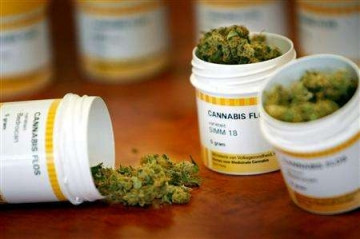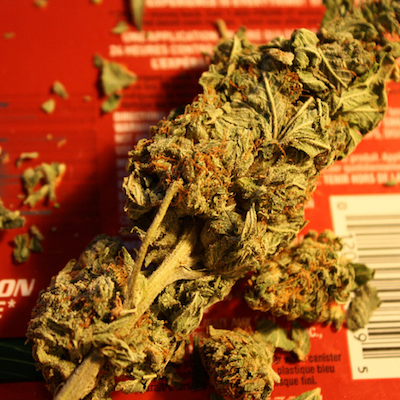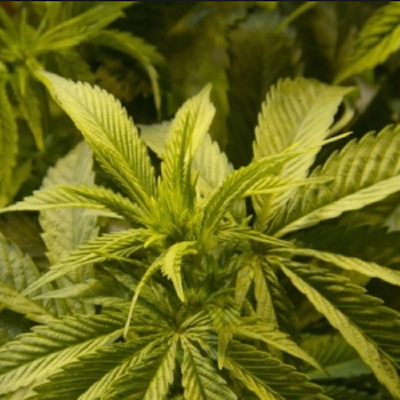Are Medical Marijuana Users in Rhode Island Risking Their Jobs?
Wednesday, February 05, 2014
Rhode Island is one of only a handful of states to extend employment protections to medical marijuana users.
But the impact of workplace policies on medical marijuana remains murky for many. Are patients really protected?
“We have no litigation on this,” said JoAnne Leppanen, executive director of the Rhode Island Patient Advocacy Coalition (RIPAC), who said most early patients were disabled. “None.”
GET THE LATEST BREAKING NEWS HERE -- SIGN UP FOR GOLOCAL FREE DAILY EBLASTHowever, Leppanen said her coalition did receive phone calls, usually from patients concerned with pre-employment drug tests. Two currently unresolved cases involve one patient who was let go from employment, which may go to arbitration, and a second individual who was being denied a position with a company based out of state.
“The issue is this: When employers test for marijuana, they're supposed to be testing for drugs of abuse, they're not supposed to be testing for medicine,” spurring an issue of medical confidentiality, Leppanen said. “We're definitely concerned about it.”
State law protects patients
In most states where medical use is regulated, individuals who lawfully use the drug at home still run the risk of violating company policies and failing drug tests. Anti-discrimination laws like the Americans with Disabilities Act don't cover medical marijuana patients because the drug is still listed as an illegal federal controlled substance.
According to Rhode Island's medical marijuana law, “no school, employer, or landlord may refuse to enroll, employ, or lease to or otherwise penalize a person solely for his or her status as a cardholder.”
Legislative restrictions to the law that have challenged those protections, such as allowing landlords to refuse tenants who lawfully grow medical marijuana, have been unsuccessful to date.
Leppanen said those protections reflected the fact that the state was more focused on the medical application of cannabis. “Rhode Island takes this program seriously, and it really is a medical program.”
Delaware, Arizona, Maine, and Connecticut also offer varying levels of protection from workplace discrimination. Some 20 states and Washington, D.C. currently regulate marijuana for medical use.
“It's a very important issue for me, and for us, for the medical marijuana movement nationally,” said Jesse Stout, an attorney and former RIPAC executive director during the time in which the state passed medical marijuana reforms. “Many medical marijuana patients are able to work and ... to be able to support themselves (while using medical marijuana) is a very important quality of life issue.”
Not treated identically to other medications
At the same time, an employer has no obligation to accommodate the medical use of marijuana in the workplace, due largely to the drug's federal categorization as a Schedule 1 controlled substance, a level for drugs with no accepted medical use and a high potential for abuse like heroin.
“At the end of the day it's still illegal under federal law, and that gives employers a lot of rights,” according to Kabrina Chang, an assistant professor in the Markets, Public Policy and Law department at Boston University School of Management.
According to Chang, workplace rights are becoming one of the larger policy issues to come out of medical marijuana reform. “For the communities that pass specifically medical marijuana laws, it never occurred to them that the people they were trying to help would lose their jobs.”
Leppanen said most of the challenges in Rhode Island came from individuals applying for jobs with national chains, but issues were usually resolved once companies were told of the state's law.
Are patients protected in Rhode Island?
Schools, colleges, and other federal grant recipients must follow the Safe and Drug-Free Schools and Communities Act. How do those regulations affect practices on Rhode Island's college campuses?
“It is difficult for us to provide a specific response,” responded Lisa Pelosi, director of communications and media relations at Johnson & Wales University, when asked how her institution might handle an employee who underwent a drug test.
“Overall, we would consider the facts and the circumstances of the person’s medical situation and his or her duties/responsibilities at the university and the reason why a drug test was administered and then be guided by the university’s drug-free policy,” Pelosi said.
In its student handbook, Roger Williams University states the university must comply with federal law, and so must students, on- and off-campus. “However, students who possess a lawfully issued medical marijuana card and use marijuana for that purpose in private, off-campus residences will be exempt from University policy in that regard.”
Most patients nationally aren't protected under state laws
A proponent of the reforms, the Marijuana Policy Project's latest estimate tallies about 1 million medical marijuana patients across the U.S.
Advocates say medical marijuana should be treated like any prescription medication. But in many states, lawful users can be fired.
In one wrongful employment termination suit, Ross v. RagingWire Telecommunications, California's Supreme Court ruled in 2008 that it wasn't a violation of state law for an employer to fire an employee who tested positive for marijuana, even though the employee was legally prescribed the drug for medical purposes.
In Michigan, Joseph Casias, a man with sinus cancer and an inoperable brain tumor, was a registered medical marijuana patient who twisted his knee at work in 2009. A Wal-Mart employee for five years — and “associate of the year” in 2008 — Casias was fired following a drug test prompted by his workplace injury.
Courts in Colorado, Washington, Montana, and Oregon have also sided with employers who've terminated employees for medical marijuana use.
With a growing number of registered patients in Rhode Island (close to 7,000 today), Leppanen expressed a belief that the law's workplace protections would eventually be challenged in court. She said with people afraid of losing employment, there were cases of individuals not seeking medical marijuana and running that risk. “Nobody wants to be the test case.”
But, “we do need some guidance from the courts on this,” she added.
Related Slideshow: New England States with Highest Marijuana Arrest Rates
Related Articles
- ACLU Defends Longtime Medical Marijuana Users Against State
- State Budget Paves Way For Medical Marijuana Dispensaries
- BREAKING: Chafee Gives Thumbs Down On Medical Marijuana
- State Report: Medical Pot, Central Falls Corruption & Educating Poll Workers
- Medical Marijuana Vote Set for Today
- NEW: Lawmakers to Take Up Medical Marijuana Bill Next Week
- NEW: Medical Marijuana ‘Consultancy’ Shut Down By Dept. of Health
- RI Dept. of Health Approves First Medical Marijuana Dispensary
- RI Hospital Expert: Is Medical Marijuana Bad for MS Patients?
- RI’s Own Miss Universe Olivia Culpo Advocates for Medical Marijuana


















